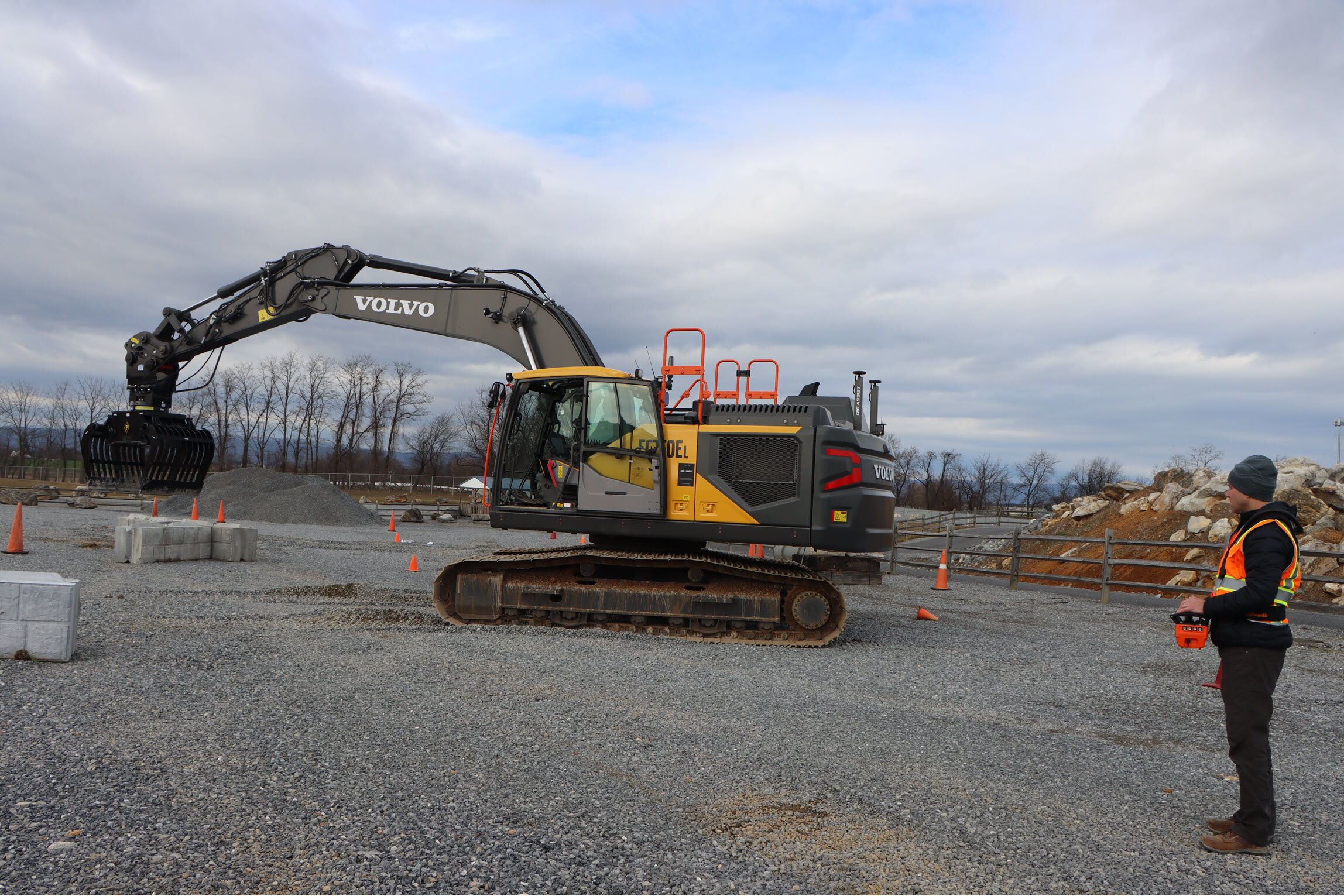Discover the Relevance of Excavator in Modern Building And Construction Projects
Excavators are essential devices in modern building jobs. Their versatility allows them to carry out a large array of tasks, from excavating and grading to demolition and site preparation. Advanced functions, such as hydraulic add-ons and GPS, improve their capacities and efficiency on work websites. As the sector evolves, the relevance of excavators expands also more. Recognizing their duty can expose insights right into the future of building and construction methods. What lies in advance for these makers?
The Adaptability of Excavators in Different Projects
Although excavators are commonly linked with large building jobs, their versatility permits them to be utilized in a large range of applications, from household landscaping to energy upkeep. In city settings, excavators can browse limited rooms to dig structures for homes or mount drain systems. Their capability to execute delicate jobs makes them perfect for landscape design jobs, where they can dig deep into for fish ponds or plant trees. Furthermore, excavators play a necessary function in utility maintenance, efficiently excavating trenches for pipelines or cable televisions without interrupting surrounding areas. In agricultural applications, they help in land clearing up and soil prep work. Their versatility allows them to be geared up with numerous add-ons, boosting their capability across various tasks. This multifaceted nature of excavators not just improves different building processes but likewise shows their integral function in modern framework development and upkeep.
Key Attributes and Kinds Of Excavators
The discussion on key features and sorts of excavators highlights the vital qualities that make these makers indispensable in building. Numerous excavator types, each designed for details tasks, demonstrate their adaptability and effectiveness throughout various applications. rc excavator. Understanding these attributes and categories is important for optimizing their use in contemporary building and construction jobs
Excavator Keys In Overview
Excavators play a critical role in contemporary building, providing adaptability and efficiency throughout various tasks. These heavy machinery units been available in numerous kinds, each customized for certain applications. The most usual types include spider excavators, understood for their stability on unequal terrain, and wheeled excavators, which supply higher mobility on smooth surface areas. Tiny excavators are preferred for small projects and limited areas, while long-reach excavators are made for deep excavating. Furthermore, there are specific excavators, such as hydraulic excavators, which boost power and precision. Each type features unique capabilities, making them vital for tasks ranging from excavating and grading to demolition and product handling. Recognizing these variations permits building and construction specialists to choose the ideal excavator for their task needs.
Key Features Explained
Recognizing the crucial functions of excavators improves their effective application in building jobs. Excavators are defined by their powerful hydraulic systems, which provide the required pressure for digging, training, and relocating products. Their articulated arms permit a large range of activity, helping with accurate operations in restricted spaces. Additionally, the variety of add-ons, such as pails, grapples, and augers, expands their convenience to fulfill various project demands. The size and weight of excavators also add to their security and maneuverability on numerous terrains. Furthermore, advancements in technology have caused the combination of GPS and automation, enhancing accuracy and effectiveness in excavation jobs. These features jointly position excavators as crucial tools in modern-day building and construction.
Applications in Building and construction
Transforming building websites, excavators play a critical function throughout various applications, ranging from household building tasks to large-scale facilities growths. These flexible equipments are equipped for jobs such as digging foundations, trenching for energies, and website grading. Various sorts of excavators, consisting of crawler, wheeled, and mini excavators, provide certain benefits customized to the task requirements. Crawler excavators master rough terrains, while rolled excavators offer flexibility on paved surface areas. Mini excavators are optimal for restricted spaces, making them preferred in city settings. The effectiveness and power of excavators considerably quicken building procedures, making sure timely job completion. Their flexibility better enhances their value, permitting building and construction teams to take on a varied range of difficulties successfully.
Enhancing Effectiveness and Productivity on Job Sites
Optimizing performance and performance on job websites is an important goal in modern building and construction. Excavators play a critical duty in achieving this goal by streamlining numerous tasks. Their capability to do multiple features-- such as digging, grading, and lifting-- minimizes the demand for extra equipment, thus saving time and resources.Moreover, excavators enhance process by allowing for faster conclusion of jobs. With innovative functions like hydraulic accessories and GPS modern technology, they can execute accurate operations that lessen mistakes and revamp. This precision not just improves the quality of work however also maximizes material usage, adding to set you back savings.The convenience of excavators allows them to adapt to various website problems, making certain that jobs proceed smoothly despite obstacles. By incorporating excavators right into building and construction procedures, groups can considerably increase their general efficiency, leading to timely project conclusion and boosted earnings.
Safety Advantages of Utilizing Excavators
Excavators significantly improve safety and security on building and construction sites through improved operator exposure and minimized hands-on labor risks. By giving drivers with a clear view of their surroundings, excavators aid to protect against injuries and crashes. Furthermore, the equipment reduces the demand for workers to engage in dangerous hands-on tasks, better promoting a safer work environment.
Boosted Driver Visibility
Although construction sites can be disorderly and loaded with prospective risks, improved operator presence plays a necessary role in guaranteeing security when making use of excavators. Modern excavators are designed with big, unobstructed home windows and purposefully placed mirrors, permitting drivers to keep a clear view of their environments (rc excavator). This improved visibility is important for identifying pedestrians, other machinery, and numerous barriers, considerably reducing the threat of mishaps. In addition, lots of excavators integrate innovative innovation, such as sensing units and video cameras, to give drivers with additional viewpoints, further improving recognition. The capability to see more clearly not only help in reliable operation but likewise cultivates a much safer workplace, making it easier for operators to navigate complex building and construction sites without endangering safety standards
Minimized Manual Work Risks
When hand-operated labor is lowered through the usage of excavators, many safety advantages arise, noticeably improving the health of construction workers. Excavators lessen the physical pressure related to heavy training and repetitive jobs, properly decreasing the danger of bone and joint injuries. By automating procedures such as excavating, grading, and moving products, they permit employees to keep a safer distance from potential dangers. In addition, excavators are outfitted with sophisticated safety and security functions, such as rollover protection systems and boosted driver functional designs, which additionally secure employees on site. The result is a considerable decrease in office crashes and injuries, leading to enhanced productivity and spirits among building and construction teams. Ultimately, the adoption of excavators contributes to a more secure and extra efficient construction environment.
Excavators in Earthmoving and Website Prep Work
In modern building, a considerable section of earthmoving and website prep work jobs depends on the efficiency and flexibility of excavators. These machines are made to handle various dirt types and terrain, making them important for grading, excavating, and click for source trenching tasks. Their hydraulic arms can be outfitted with various add-ons, such as augers and buckets, allowing operators to tailor their method based on certain job requirements.Excavators succeed at relocating huge quantities of earth rapidly and efficiently, which increases the total building and construction timeline. They can navigate limited areas and testing sites where typical tools may battle, improving efficiency. In addition, the precision of excavators guarantees that website prep work abides by strict specs, decreasing the threat of errors that can cause costly rework.
The Function of Excavators in Demolition Tasks
Excavators play a vital duty in demolition jobs, as they possess the power and agility required to dismantle frameworks successfully. Outfitted with numerous attachments such as hydraulic breakers, shears, and grapples, these devices can adjust to various demolition needs, whether for small buildings or huge industrial sites. Their adaptability allows operators to tackle intricate jobs while maintaining safety and precision.In enhancement to their demolition capacities, excavators facilitate particles elimination, making sure that work websites stay secure and well organized. By damaging down frameworks into workable pieces, they allow for streamlined clearing and recycling of products, straightening with modern-day sustainability efforts.Moreover, excavators can access limited rooms and browse unequal terrain, making them crucial in urban demolition jobs. Generally, their robust layout and multifunctionality make excavators an important asset in the demolition stage of construction, contributing significantly to task timelines and efficiency.


Future Patterns in Excavator Innovation and Usage
As the construction market advances, innovations in excavator technology are positioned to transform their usage and effectiveness significantly. One significant trend is the assimilation of automation and expert system, permitting excavators to run with minimal human treatment. This change will certainly improve accuracy in jobs such as grading and trenching, minimizing human mistake and raising productivity.Additionally, the surge of electric and hybrid excavators is forming a more lasting construction atmosphere, lowering carbon exhausts and gas costs. Boosted telematics systems are additionally arising, enabling real-time monitoring of equipment performance and upkeep needs, which can lead to much better functional performance and longer equipment lifespan.Moreover, improvements in accessory modern technology are increasing the convenience of excavators, enabling them to execute a wider variety of tasks. The mix of these trends demonstrates a future where excavators are smarter, greener, and more adaptable, inevitably improving building job characteristics.
Often Asked Concerns
Just How Do Excavators Compare to Various Other Building Machinery?
Excavators, defined by their convenience and power, stand out in digging and earthmoving contrasted to other equipment. Their capacity to carry out different jobs, including lifting and demolition, makes them indispensable in construction jobs, boosting overall efficiency.

What Is the Typical Life Expectancy of an Excavator?
The typical life-span of an excavator typically varies from 7,000 to 10,000 operating hours, relying on maintenance, use conditions, and design. Correct care can prolong this life expectancy, making sure peak efficiency throughout its operational years.
How Are Excavators Preserved for Ideal Performance?
Excavators call for routine upkeep for peak efficiency, consisting of routine examinations, liquid checks, filter substitutes, and timely fixings. like it Carrying out a preventive upkeep routine aids prolong their find out here now life-span and warranties effective procedure in numerous building and construction settings.
What Are the Expenses Connected With Buying an excavator vs. leasing?
The prices connected with acquiring an excavator versus leasing differ significantly. Renting offers lower upfront expenditures yet can collect gradually, while buying needs a significant first investment, but gives long-term savings and property ownership advantages.
What Training Is Called For to Run an Excavator?
Operating an excavator calls for specialized training, typically including security procedures, machine procedure techniques, and environmental recognition. Qualification programs commonly mandate functional experience, making it possible for drivers to take care of various tasks effectively while ensuring compliance with sector guidelines. The most usual kinds consist of spider excavators, understood for their stability on unequal surface, and wheeled excavators, which give better flexibility on paved surfaces. Mini excavators are favored for limited rooms and small jobs, while long-reach excavators are designed for deep excavating. Furthermore, there are specialized excavators, such as hydraulic excavators, which improve power and accuracy. Different kinds of excavators, consisting of crawler, rolled, and mini excavators, offer details advantages customized to the project needs. Spider excavators stand out in rough surfaces, while rolled excavators provide flexibility on paved surface areas.